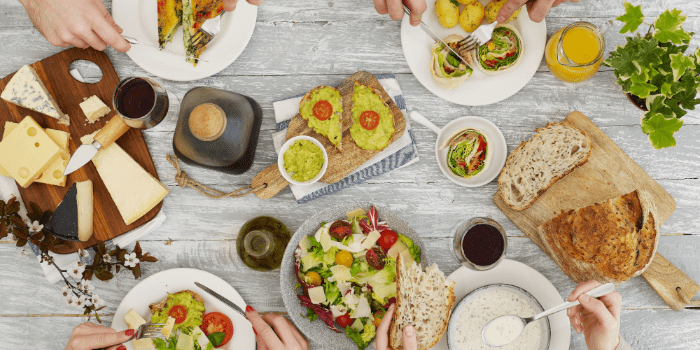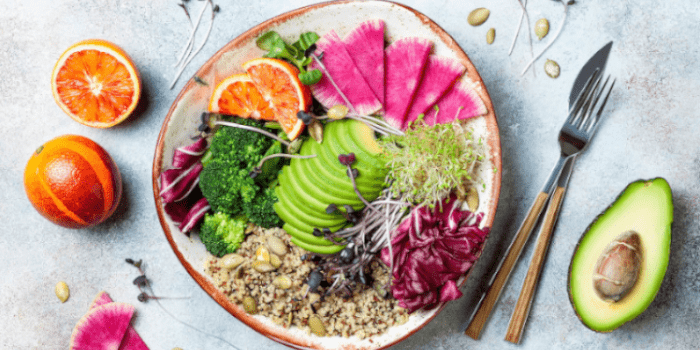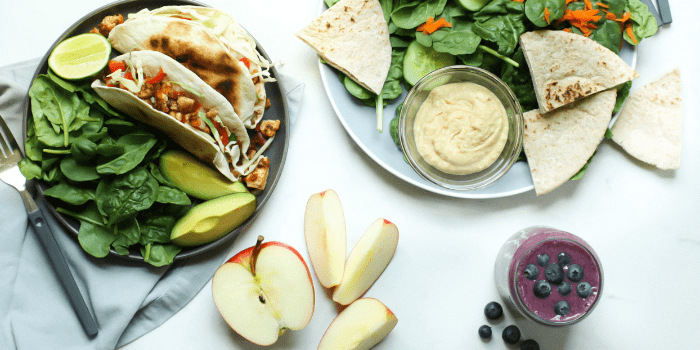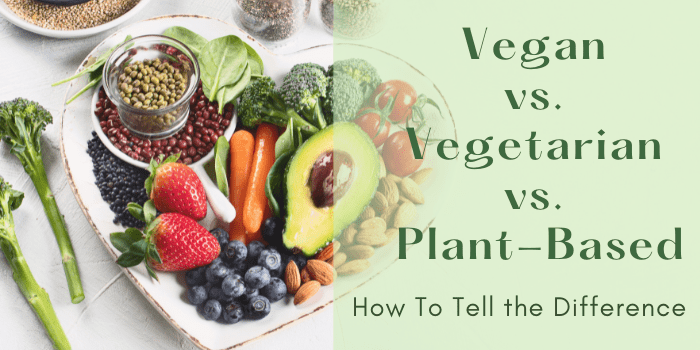In this day and age, you’ve probably heard the terms “vegetarian”, “plant-based”, or “vegan” thrown around quite often, or perhaps you have a family member or friend who identifies as one.
If you aren’t familiar with the terms, it can be a little challenging to differentiate between all categories and subcategories for these types of diets.
Today, we’ve created a little guide on helping you to understand each type of diet, as well as the different sub diets that come with it.
So, whether you’re looking into a lifestyle change for yourself or just want to become more knowledgeable in this sphere, this article is for you!
This post contains affiliate links which may earn us a small commission.
Vegetarian Diet

Those on a vegetarian diet generally don’t eat meat, fish, or dairy and eggs, unless specified otherwise. This is often due to either ethical or health reasons, and the diet itself leaves more room for flexibility.
For example, within the vegetarian diet, there are a few sub-categories such as:
- Lacto-vegetarian – This is someone who consumes dairy while eliminating meat, fish, and eggs.
- Ovo vegetarian – Someone who does consume eggs but eliminates meat, dairy, and fish.
- Pescatarian – This type of vegetarian eats fish and may or may not consume dairy and eggs as well.
Additionally, you can have lacto-ovo vegetarians, who eat both eggs and dairy but eliminate fish and meat. Another term for this is “flexitarian,” which is basically a “flexible or casual vegetarian.”
Overall, a vegetarian lifestyle is a great way to try out some healthy and delicious dishes that are easy and affordable. If you’re interested, I highly recommend this 30-minute vegetarian cookbook!
Last update on 2024-04-19 / Affiliate links / Images from Amazon Product Advertising API
Vegan Diet

The vegan diet is a little more strict.
Someone who is vegan has eliminated all eggs, dairy, fish, and meat from their diet, including honey products.
Simply put, a vegan is someone who cuts out all animal products and by-products from their diet including their overall lifestyle.
Additionally, a vegan individual won’t wear or purchase anything that contains animal byproducts in skincare, clothes, supplements, and so on.
A vegan diet is generally rich in:
- Nuts and seeds
- All types of legumes
- Fruit and vegetables
- Vegan-friendly pasta
- Grains and pulses
- Tofu and similar soy by-products
However, there are exceptions. For example, someone who may choose to become vegan for health reasons may still use skincare products derived from living beings, like beeswax – a popular additive in most beauty products.
If you want to learn more about the vegan lifestyle and diet, check out this handy vegan starter kit.
Last update on 2024-04-19 / Affiliate links / Images from Amazon Product Advertising API
Plant-Based Diet

With all that said, you might be wondering what’s the deal with the plant-based diet. This term is coined quite frequently nowadays, as more people are switching to this type of lifestyle.
Simply put, those who eat mainly a plant-based diet don’t consume any animal products like fish, meat, eggs, or dairy. It’s pretty similar to the vegan diet; the only difference is that a plant-based diet avoids processed foods and focuses more on products in their natural form.
For example, a plant-based diet is often rich in grains, nuts, salads, legumes, pulses, and so on. There are actually some pretty great plant-based recipes available nowadays that are highly rich in nutrients while still remaining delicious.
Last update on 2024-04-19 / Affiliate links / Images from Amazon Product Advertising API
Why People Choose This Lifestyle

There are many reasons why someone may choose to go down the vegan, vegetarian, or plant-based path.
Sometimes it’s due to health since it has been proven how beneficial a vegan or vegetarian diet can be, especially regarding weight, blood sugar levels, cholesterol, and more.
For others, it can be down to ethical reasons, as many individuals don’t want to harm living beings for their products or by-products.
Whatever the reason, it’s essential to know that a plant-based or vegetarian diet doesn’t automatically equal a healthy lifestyle. Unfortunately, there are still plenty of processed or high sugar products on the vegan-friendly shelf but full of fat and additives.
Hopefully, this guide cleared some things up for you!
Have you ever tried any of these diets, or maybe you have some more insight for us? Let us know your thoughts in the comments below and thanks for reading.

Anna Miller is a content manager at TrashBackwards. She’s passionate about living a zero-waste lifestyle. Anna has been writing about eco-friendly tips for years now, and she’s got some great ideas on how you can go plastic-free! She loves sharing her knowledge about eco-lifestyle with others. Her articles are always witty and insightful! Shoot her a message if you’ve got any questions about how you can start going green.






